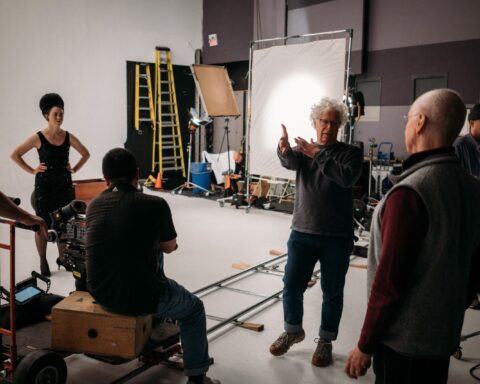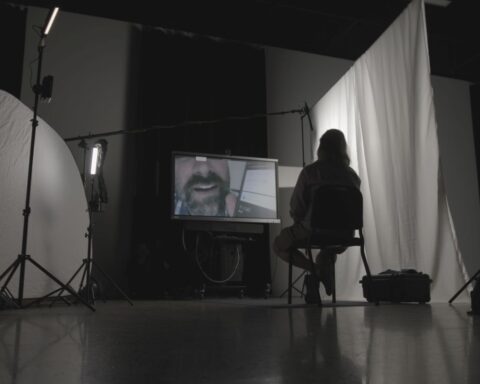Programme: Wavelengths (World Premiere)
Canada, 87 min.
Directed by Mark Lewis
The city symphony film sings of the power, energy, and life of the city as grand music steps in tune with the hustle-bustle of the rat race in 1920s features like Man with a Movie Camera and Berlin, Symphony of a Great City. What happens, though, when a filmmaker removes the symphony from the equation? Canadian contemporary artist/filmmaker Mark Lewis boldly resurrects the city symphony film by playing with urban life below pianissimo: there’s barely a sound to hear in the NFB film Invention, but it perfectly captures the poetry of daily life.
Lewis uses his camera like an all-seeing eye as Invention moves through the buildings and streets of Toronto, Paris, and São Paolo. The cerebral cinematography by Bobby Shore and Martin Testar assumes points of view largely unobtainable to the human eye as Invention pans, tilts, and cranes around the city, moving on horizontal, vertical, and diagonal plans, to envision the urban world as a life force. Skilfully touring up and down spiral staircases, or floating through and above buildings while apparently breaking through glass in a long take, the film reconfigures the way that one looks at urban landscapes. Invention plays like a non-fiction amalgam of Terrence Malick and Frederick Wiseman with its artistic observations. The film gives viewers a perspective on city life that they simply can’t see themselves.
Whether one feels like a voyeur or like a pigeon soaring above the city, though, Invention inspires awe with its hypnotic mediation on daily life. Watch patiently—and Invention definitely demands and rewards patience—from the very beginning with long takes offering a hypnotic observation of Jacques Prou’s Amphitrite the Louvre. As the camera pans around the statue to caress every curve and explore every contour of her body, Lewis evokes a uniquely tactile film experience. Invention invites the audience to touch and explore elements of life that the ordinary citizen might not be able to taste. An immersive look at a masterful work of art is just the beginning.
Fly Canada-ward as the omnipotent viewpoint of Invention lingers above a window and slowly zooms in, filling the frame with colour to restore the greyscale world to its full spectrum, and the camera looks out at Torontonians going back and forth in the depths of winter. As the camera spindles up the wall like a spider and does a full turn, Invention induces vertigo as it renders beautiful one of the ugliest elements of urban life: the daily commute.
It’s in this moment that the silence of Invention becomes palpably deafening. A few beeps at the beginning of the film signal an audio track simply to note its ensuing absence, but after the quiet, hushed stroll through the city, the film lets audiences observe the cacophony of urban movement while enjoying the serene silence of the moment. It’s strange to find such peacefulness in downtown Toronto. One doesn’t hear much traffic behind glass from stories above, so Lewis astutely ensures that the film remains authentic and reliable while embellishing its artistic documentation of mundane action by eschewing the very elements—sound, narrative—that most films exploit to engage viewers with the life of a city.
The energy, however, is riveting as Invention finds fragments of narrative by stealing episodes from anonymous citizens around the city. Take one playful cyclist, for example, who clears an area in the snow with his shovel to reveal a fine square of ice before hopping back on his bike for some fun. He performs a few moves, pirouettes and wheelies, with innocence and grace as Lewis captures his action unawares from the vantage point above. Then, long after the camera changes its gaze with a fit of its short attention span, the cyclist peddles through the frame, presumably on the way home. It’s a delightfully intimate moment as the film creates accidental art by letting the objects in the frame create stories on their own.
The manoeuverings through the halls of the Louvre and above the streets of São Paolo are equally affirming glimpses into the imperceptible traces of beauty that pass by in everyday life. The film privileges viewers to snippets of lives of neighbours and strangers alike. Invention, like a grandly cinematic gallery installation, lets the energy of the city wash over the viewers and envelop them. It’s an immersive experience. One only snaps out of it at the very end when sound punctuates the film and tragedy strikes. The move is a shrewdly unnatural violation of the sense of ease one feels while watching the film and the sentiment is appropriate as Invention ends with the loss of one of the many citizens who brings the film to life. It’s an exquisite mediation of all one takes for granted in a busy metropolis.
TIFF 2015 Screenings:
Saturday, September 12
AGO (Art Gallery of Ontario), 5:00 PM
Sunday, September 13
TIFF Lightbox, 9:15 PM










